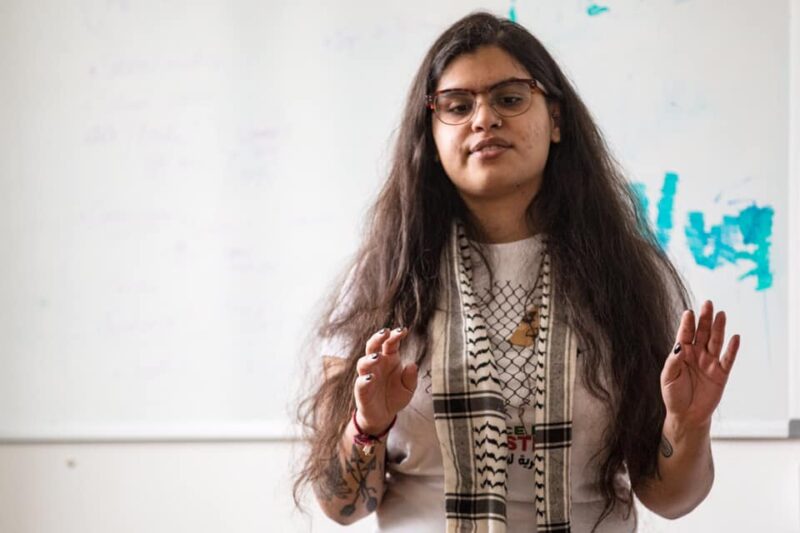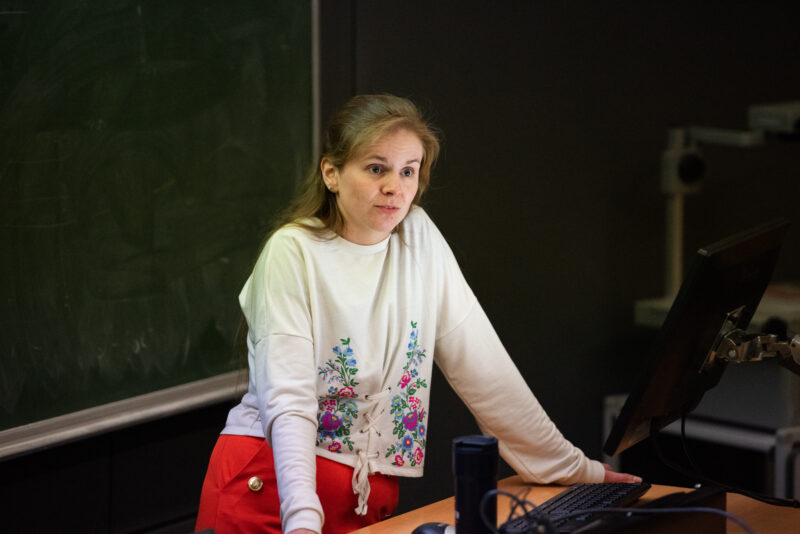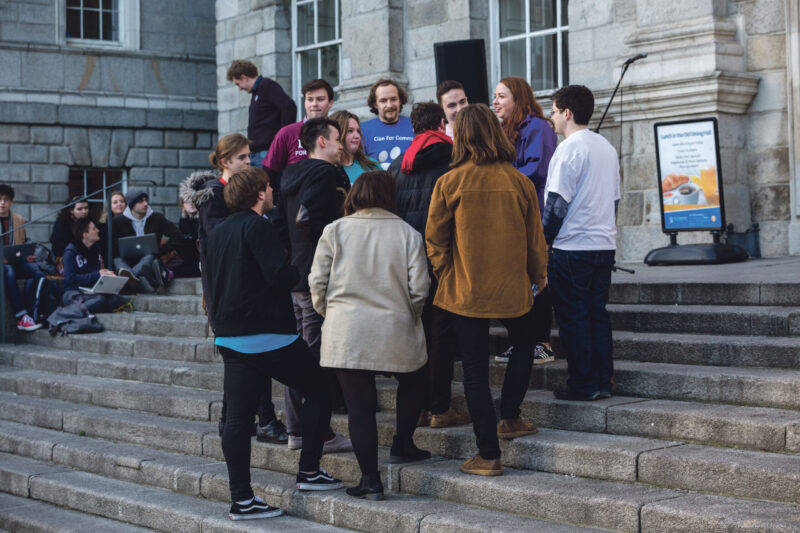Student engagement: it’s a timeworn debate. Year after year we watch, detached, as yet another class of sabbatical officers take office in House Six, convinced that they will be the officers to resolve the issue of student engagement. This phrase is bandied about at election hustings, routinely appears on manifestos and becomes a kind of refrain for campaign teams over the course of any given election period.
But is this really something that can be implemented by any one officer, or any one set of officers? Is there any number of part-time officers, ents events or weekly emails that will successfully establish Trinity College Dublin Students’ Union (TCDSU) as the hub of student activity?
In Trinity, the traditional students’ union structure comprises a president alongside the education, welfare, communications and marketing and ents officers. But why has this make up become an accepted, unquestionable and immovable fact? Can a structure first conceived of in 1968 really be expected to fulfill the demands of a rapidly diversifying student population in 2020?
There is little clarity on what candidates are actually concerned about when they bemoan waning “student engagement” with TCDSU. Is it event attendance that they are worried about? Is it students’ mental well-being? Is it a concern about the lack of activism on campus?
If half of your population is women, are they really getting enough representation in just one part-time officer?
The challenge facing officers isn’t necessarily to do with the nature of their events or the ingenuity of their policy ideas. If anything, a review of the positions themselves might be in order – are students really invested in the existence of a communications and marketing officer? How sincere is students’ attachment to the ents officer and does last year’s vote to reduce the timeframe of the position betray a lack of regard for the role?
In terms of the position of welfare officer – arguably the most student-oriented of all the sabbatical positions – its nebulousness renders it, at times, redundant. Such is the all-encompassing nature of the title, the officer is often required to pick and choose key issues affecting the student body. Sara Khan, liberation and access officer of the University of Manchester, says that the role is “artificial”. “In reality, one person can’t do all of that, so instead they must focus on the key issues and branch out in different ways as the structure allows.”
Across the UK, it would seem, students aren’t so willing to submit to these structures and have taken matters into their own hands. In 2013, students in University College London called for a referendum that would introduce four so-called liberation officers to its students’ union. Since then, the union has undergone significant review. As women’s officer – a role that is completely absent from the Irish student union landscape – Nilisha Vashist works intensively with student focus groups to help her represent accurately and effectively. Vashist points out that although Trinity has a part-time gender equality officer, the role is far from adequate: “If half of your population is women, are they really getting enough representation in just one part-time officer?”

Sara Khan is the liberation and access officer of the University of Manchester.
According to Emma Hurson, the auditor of Dublin University Gender Equality Society (DUGES), the answer is no. Hurson argues that the need for sufficient representation for self-identifying women on campus is pressing in Trinity. “We should be given pads instead of condoms at freshers’ fair – it’s insulting and normalising”, she says, reflecting on what she views as the union’s continued lack of appreciation for its female students’ needs.
Similarly, the part-time position of Trinity’s officer for students with a disability does not seem adequate in terms of being able to represent the 1,629 students with disabilities on campus. One only needs to ask Jess O’Brien, who’s full-time disabilities officer at Cambridge University, of the need to provide students with disabilities with adequate support. With 20 per cent of the student population at Cambridge requiring disabilities support, she sees the role as being absolutely necessary, if not actually overwhelming at times. “People grab me on the street”, O’Brien explains. She goes so far as to say that “engagement is too much” – something that a TCDSU sabbatical officer might ever only ever dream of saying.
Despite the fact that Cambridge and Trinity students suffer from similarly intense workloads and high academic standards, not to mention the inaccessibility of our historic buildings, the difference in their delivery in disability services is striking. While Cambridge’s students’ union has proactively reacted to the needs of its students, TCDSU has unquestioningly maintained only a part-time disabilities officer position, with no movement being made toward instating its full-time equivalent.
For the current disabilities officer, third-year business and sociology student Courtney McGrath, the challenge to balance college, a job and the demands of the part-time role is a real “strain”. In fact, so taxing is the effort to strike this balance that she says, with a hint of irony, that the role of disability officer is “not properly accessible”. Perhaps, just as UCL’s Vashist suggested, a re-evaluation of the position and agency of part-time officers within TCDSU is in order, especially given the demanding nature of the role and the voluntary basis of the work.
The willingness to adapt and challenge the deficiencies of a regimented system could bring forth the dynamism that TCDSU is so sorely in need of – it needs to open itself up to the possibility of major structural re-evaluation if it is ever to achieve a meaningful level of student engagement. At UCL, reviews of the union’s structure take place every two or three years. Vashist says the union “is constantly asking what is the student population like now? what does it need now?”.
Britany Bowles, the sports officer of Sheffield University’s students’ union – the top-ranked student union in Britain – has seen first hand the benefits of a malleable students’ union. She says: “I’m very fortunate to work in an SU that is open to change. Entrenched in our thinking is that we need dedicated officers as these things are very important to students and they need that support.”
The union is constantly asking what is the student population like now? what does it need now?
It can be argued that once a union finds itself stagnated in its structure, as TCDSU arguably has, it struggles to maintain its relevance to students’ lives, and, in turn, its capacity to engage with them in any comprehensive way.
The major force of change in union politics is the referendum – only last week, students in the University of Nottingham overhauled their union’s structure. Lee Taylor, the union’s part-time environment and social justice officer, says that the referendum introduced a non-hierarchical model – consisting of engagement, education, liberation and sustainability departments – as a direct response to “a system that was clearly not working”.
There is, of course, a danger in simply creating officer positions, part-time or full-time, in a ceremonial fashion – it may invite a certain sense of complacency in creating the illusion that the community in question is henceforth adequately represented.
For TCDSU’s LGBT+ rights officer, a second-year chemical science student Thomas O’Neill, this is a particularly pertinent issue.
One would expect that the community’s long-standing marginalisation in society would render the need for sincere union representation crucial. However, O’Neill concedes that while a full-time LGBTQ+ rights officer would be a “good idea”, he does not think that it should be implemented. With Q Soc a major vehicle for LGBTQ+ representation and visibility on campus, the union seems to be of secondary importance to providing an inclusive space for this community. The fact that O’Neill is unconvinced that this full-time position is necessary betrays a certain disillusionment with the union, and is very telling of the sorry state of TCDSU’s engagement.
This situation is made even more disappointing when considered in juxtaposition with the staggeringly successful campaign of University of Melbourne Students’ Union’s (UMSU) Queer Department. Since 1995, it has developed into an inclusive and supportive community for its LGBTQ+ students that has been “absolutely crucial for destigmatising queers in society”, according to UMSU’s Queer Officer Ciara O’Sullivan. O’Sullivan says that it enjoys “high engagement” with its seven intersectional collectives.
In many UK universities, at least one sabbatical position will be occupied by the Black, Asian, and Minority Ethnicities (BAME) officer. It’s arguably troubling that with a diversifying student population, TCDSU, with the exception of its part-time ethnic minorities officer position, has largely failed to confront head-on the challenges posed by racism on campus.

For the likes of Sara Khan, the liberation access officer at University of Manchester, this should be an issue of central import to any students’ union that considers itself a representative of a whole that is made up of many different communities. After all, according to Khan, minority communities get “more than just pushed aside”, – they’re often completely ignored.
However, in an email to The University Times, TCDSU Ethnic Minorities Officer Sé Ó hEidhin explains why they believe that the position provides sufficient representation to Trinity’s ethnic minority communities: “I don’t think this role would have a full role as a full time sabbat. Some roles suit better as a part time role and this is one.”
Certainly, TCDSU should take steps to reflect on the genuine concerns of its students if it wants to truly engage with them at a systematic and structural level. But can we really just continue to remain indifferent and expect the system to change by itself?
TCDSU President Laura Beston says that there “are obviously changes that will take time but it is important that the student body voices what changes they want to see, as any change must reflect what they want.”
If we want to experience the kind of meaningful impact that a students’ union can have, as it has had in the likes Nottingham, Cambridge and Melbourne, then maybe we as the student population of Trinity should stop wasting time lamenting the perceived inadequacies of TCDSU. Instead, we should spend time forging a union that can meet our demands.







